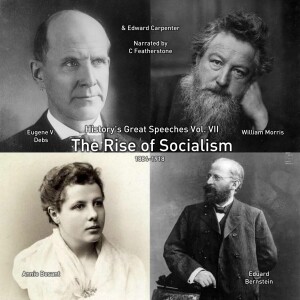
It's fascinating how much early socialism dealt with the same issues that arise in it today. This volume goes from the abstraction of the artist to the concerns of the railroad worker.
The birth of liberation movements in the nineteenth century also saw a rise in those fighting for the rights of working men and women, whose oppression remained unabated.
We begin with the poet William Morris, who believed that it was the right of every person to enjoy the fruits of art, both in the production and consumption, for the art of living should be a worthy one, and available to all. He decries the insanity of the belief “not that Commerce was made for man, but that man was made for Commerce”, with the profit motive that renders all work miserable when “It is right and necessary that all men should have work to do which shall be worth doing, and be of itself pleasant to do; and which should be done under such conditions as would make it neither over-wearisome nor over-anxious.”
Edward Carpenter demands of those whose only question is “Does It Pay?” to know why any action is undertaken. On starting a farm, he found, “that if I was happy in the life, and those working with me were well-content too, and if there were children growing up on the place under tolerably decent and healthy conditions, and if we were cultivating genuine and useful products… that it might really pay me better to get 1%, even if it involved living quite simply and inexpensively, than 10% with jangling and wrangling, over-worked and sad faces round me, and dirty and deceptive stuff produced.” Labour and production driven by the invisible hand of the free market make us all poorer in spirit.
From there, we move to misunderstandings, of Marxism and of female suffrage. Annie Besant attacks a reactionary appeal to the ‘natural’ role of men and women by pointing out that it is equality of opportunity and representation that women want, not simply poorly defined chivalry.
Eduard Bernstein confronts a misunderstanding that people still have today. Both Marx and Engels realized in their lifetimes that society was further away than they initially thought from a genuine socialism – that many small revolutions would be necessary, and that a single grand rewriting of society could not work. People still have this misunderstanding today, and the next writer also refers to it, in saying that “A few.. only know what Socialism is, and they are Socialists. The rest are opposed to it because the little they know about it is not true.”
That was spoken by the legendary Eugene Debs, the man who saw the birth and corporate corruption of unions. He rails against the approach government takes in promoting “dog-eat-dog” unionism, and the ridiculous “equality” between capitalist and labourer. “President Roosevelt said: “I would be false to your interests if I failed to do justice to the capitalist as much as to the wage worker.”… Precisely! “Our interests are one,” exclaimed the fox, after devouring the goose…; and “I congratulate you upon your wise political economy” was the amen of the lion as the lamb’s tail disappeared down the red lane.”
We end with Debs' response to being convicted of sedition for speeches against the First World War. He was sentenced to ten years imprisonment after winning millions of votes over the last two decades as the socialist party candidate, for the crime of “opposing a social order in which it is possible for one man who does absolutely nothing that is useful to amass a fortune of hundreds of millions of dollars, while millions of men and women who work all the days of their lives secure barely enough for a wretched existence. This order of things cannot always endure.”
No comments yet. Be the first to say something!